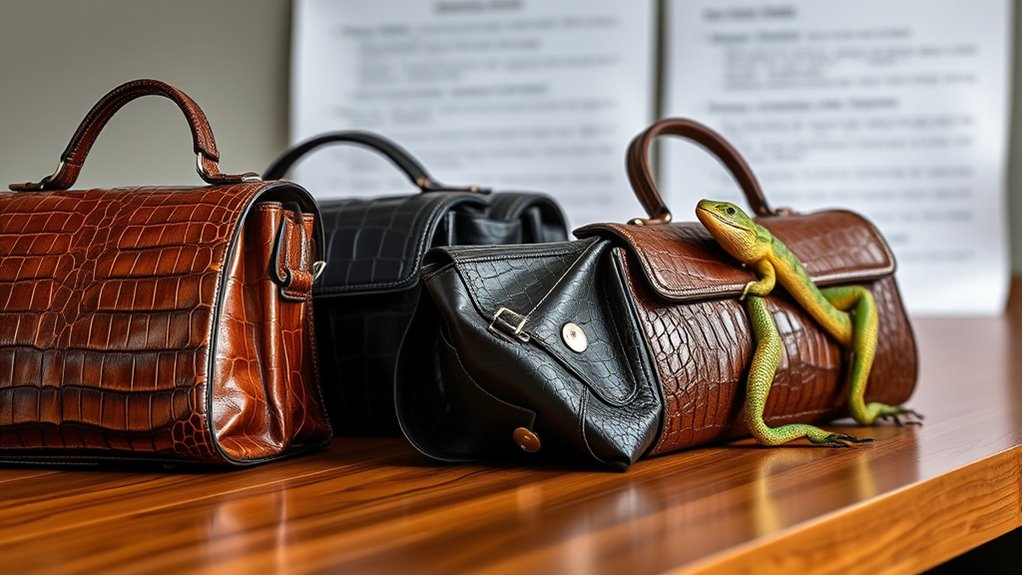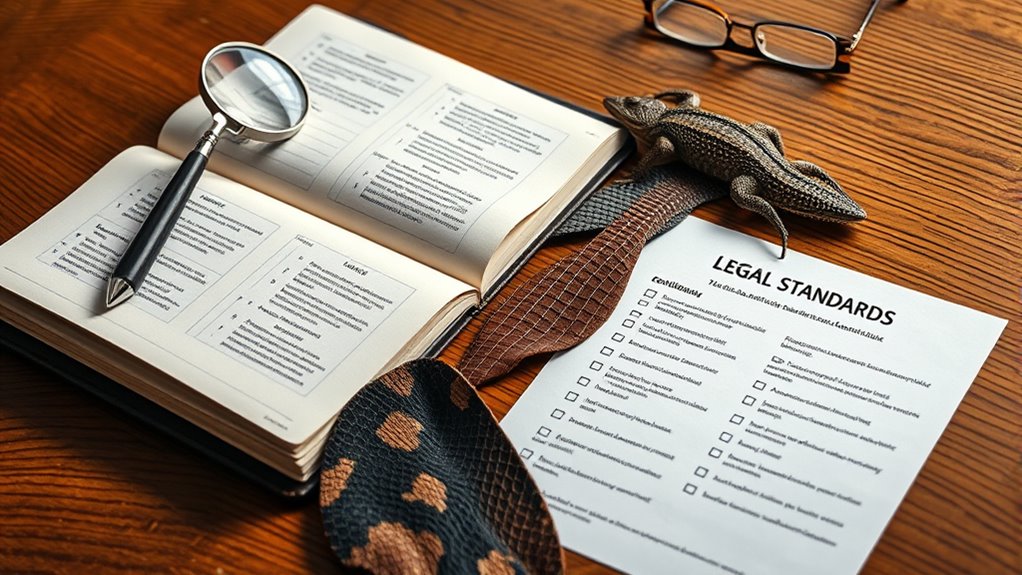When dealing with exotic leather bags, you need to guarantee your materials come from legal, sustainable sources and meet strict regulations like CITES. Verify your suppliers have proper certifications and documentation proving ethical harvesting. You must also secure necessary permits for import and stay updated on changing laws to avoid fines or confiscation. Proper compliance not only protects wildlife but also safeguards your business’s reputation. Continuing this exploration will help you master these essential legal requirements.
Key Takeaways
- Verify that materials are sourced ethically and legally, complying with international trade laws like CITES.
- Obtain necessary permits and documentation to demonstrate legal origin of exotic leathers.
- Ensure suppliers adhere to sustainability standards and have relevant certifications.
- Stay updated on changing import regulations and international agreements affecting exotic leather trade.
- Maintain transparency and thorough records to ensure compliance and protect your business legally.

Exotic leather bags are increasingly popular, but buying or selling them involves maneuvering complex legal requirements. One of the most important aspects to consider is sustainable sourcing. When dealing with exotic leathers, you need to verify that the materials come from ethical and legal sources. This means verifying that the animals involved were not illegally poached or harvested. Many countries have strict regulations to prevent the trade of endangered species, so you must confirm that your suppliers comply with these laws. Sustainable sourcing isn’t just about legality; it also reflects a commitment to environmental conservation and animal welfare. By prioritizing suppliers who adhere to these standards, you protect yourself from legal repercussions and support ethical practices within the industry. Additionally, understanding the specific regulations in your country can help you avoid unintentional violations and ensure compliance from the outset.
Alongside sustainable sourcing, understanding import regulations is crucial. When importing exotic leather bags, you must navigate a maze of customs requirements, permits, and documentation. Different countries enforce varying rules, often aligned with international agreements like CITES—the Convention on International Trade in Endangered Species of Wild Fauna and Flora. CITES regulates the international trade of species that are threatened or endangered, and failure to comply can lead to severe penalties, including confiscation or legal action. Before importing, you need to secure the appropriate permits that demonstrate your products are legally sourced and compliant with all relevant laws. This process often involves submitting detailed documentation about the origin of the leather, the species involved, and proof of sustainable sourcing.
Understanding import regulations and securing permits is vital for legal exotic leather trade.
It’s also essential to stay updated on import regulations, which can change based on new legislation or international agreements. Failure to adhere to these regulations can result in delays, fines, or even bans on your products. Working with customs brokers or legal experts familiar with exotic leather trade laws can help streamline the process and ensure compliance. They can assist you in preparing the right paperwork, understanding specific country requirements, and avoiding common pitfalls.
Ultimately, navigating the legal landscape of exotic leather bags demands diligence. You need to prioritize sustainable sourcing to uphold ethical standards, while also thoroughly understanding and complying with import regulations. Doing so not only keeps you within the bounds of the law but also enhances your reputation as a responsible seller or buyer in this niche market. Staying informed and proactive ensures that your business operates smoothly and ethically in a complex, regulated environment.
Frequently Asked Questions
Are Exotic Leather Bags Subject to International Trade Restrictions?
Yes, exotic leather bags are subject to international trade restrictions to protect endangered species and promote sustainable sourcing. You need to guarantee that your bags comply with regulations like CITES, which controls the trade of protected animals. By choosing suppliers committed to animal welfare and sustainable sourcing, you help prevent illegal trade. Always verify documentation to avoid legal issues and support ethical practices in the exotic leather industry.
How Do I Verify the Legality of Exotic Leather Sourcing?
Think of verifying exotic leather sourcing as exploring a jungle of regulations. You should seek out suppliers with transparent stories, ensuring they follow sustainable sourcing practices and hold ethical certification. Check for official documentation like CITES permits and certifications from trusted organizations. By doing so, you’re planting your flag in ethical territory, making sure your exotic leather bags are not only beautiful but also responsibly sourced, respecting wildlife and global laws.
What Are Penalties for Non-Compliance With Exotic Leather Laws?
If you don’t comply with exotic leather laws, you risk severe penalties like fines, confiscation, and possible jail time. Authorities, including customs enforcement, actively pursue violations linked to wildlife trafficking, making enforcement strict. Non-compliance can also damage your reputation and lead to bans on importing or selling exotic leather products. Stay informed, verify sourcing, and follow all legal requirements to avoid these costly penalties and support wildlife conservation efforts.
Do Different Countries Have Varying Regulations for Exotic Leather Imports?
Yes, different countries have varying regulations for exotic leather imports. You need to accurately identify the species through species identification to guarantee compliance. Additionally, you must prepare proper import documentation, such as CITES permits or certificates, depending on the destination country’s laws. Failing to meet these requirements can lead to legal penalties, confiscation of products, or shipment delays, so always check each country’s specific regulations before importing exotic leather goods.
Are There Specific Certifications Required for Selling Exotic Leather Bags?
Yes, you need specific certifications to sell exotic leather bags. You must prove the leather quality meets legal standards, guaranteeing it’s ethically sourced and properly documented. Additionally, trademark requirements are vital; you must register your brand to protect your designs. These certifications verify authenticity and compliance, helping you avoid legal issues and build trust with customers. Always stay updated on regulations to make certain your products meet all legal and quality standards.
Conclusion
Understanding the legal requirements for exotic leather bags helps you make informed and ethical choices. Did you know that over 85% of exotic leather products are now certified to ensure sustainable and legal sourcing? By staying aware of these regulations, you protect wildlife and support responsible trade. Keep researching and buying from reputable sources—your choices can make a real difference in conserving endangered species and promoting ethical fashion.








